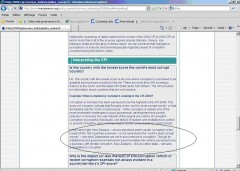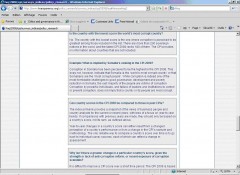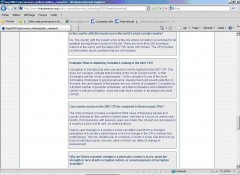12/29/2009
Illusion rate of the signature of tax agreements
The French magazine L’Expansion has published an interesting article to explain to what extent juridictions that were considered as tax havens (black list) or other financial centers (grey list, politically correct for tax havens) by OECD are cheating in their process of the signature of the required tax agreements.
Many of these jurisdiction have signed with other dubious jurisdictions: one third of every agreement was signed with tax havens.
L’Expansion publishes an interesting table per jurisdiction that I have translated below.
Exclusive in L'Expansion - Top false repented jurisdictions
|
| Tax Agreements | Of which Tax havens | « Illusion rate » |
| Austria | 15 | 10 | 67 % |
| Monaco | 13 | 8 | 62 % |
| San Marino | 13 | 7 | 54 % |
| Liechtenstein | 13 | 6 | 46 % |
| Luxembourg | 17 | 7 | 41 % |
| Aruba | 15 | 5 | 33 % |
| Belgium | 18 | 6 | 33 % |
| Bahrain | 14 | 4 | 29 % |
| Netherlands Antilles | 18 | 4 | 22 % |
| Singapore | 15 | 3 | 20 % |
| Switzerland | 12 | 2 | 17 % |
| BVI | 15 | 2 | 13 % |
| Bermuda | 16 | 2 | 13 % |
| Gibraltar | 13 | 1 | 8 % |
| Cayman Islands | 13 | 0 | 0 % |
| Average | 220 | 67 | 30 % |
L’Expansion does not take into account two other ways for cheating:
- the wording of the law to enforce the agreements, that may create loopholes;
- the process before the legislature that may be a long shot to enforce agreements with a significant delay;
- recs to go before the courts
Luxembourg illustrates these behaviours to fool OECD and contracting jurisdictions.
17:47 Posted in General | Permalink | Comments (0)
12/04/2009
Tax haven clamp down moving to enforcement phase: OECD
Reuters reported that according to Jeffrey Owens, a global crack down on tax evasion in financial centers is moving into a more difficult enforcement phase.
This is exactly what I said with the significant example of Luxembourg where the enforcement is dubious.
05:26 Posted in General | Permalink | Comments (0)
11/19/2009
TI implicitly admits in the FAQs that the CPI
I quoted yesterday Dr. Johann Graf Lambsdorff, creator of the Corruption Perceptions Index. He said in an email to the Transparency International network: "It is you, the movement, that will have to start anew to educate TI-S to deliver an acceptable product."
TI published the CPI but with a new paragraph in the FAQs that did not exist the previous years. This paragraph confirms implicitly that the CPI is of no avail and therefore is not an acceptable product.
To answer the question "Is the country with the lowest score the world's most corrupt country?", TI states in 2009 that
No. The country with the lowest score is the one where corruption is perceived to be greatest among those included in the list. There are more than 200 sovereign nations in the world, and the latest CPI 2008 ranks 180 of them. The CPI provides no information about countries that are not included.
Example: What is implied by Somalia’s ranking in the CPI 2008?
Corruption in Somalia has been perceived to be the highest in the CPI 2008. This does not, however, indicate that Somalia is the ‘world’s most corrupt country’ or that Somalians are the ‘most corrupt people’. While corruption is indeed one of the most formidable challenges to good governance, development and poverty reduction in Somalia, the vast majority of the people are victims of corruption. Corruption by powerful individuals, and failure of leaders and institutions to control or prevent corruption, does not imply that a country or its people are most corrupt.
In the same light, New Zealand – whose perceived public sector corruption is the lowest of the 180 countries surveyed – is not necessarily the ‘world’s least corrupt country’ – and New Zealanders are not in turn immune to corruption. Though its institutional and governance framework have translated into what is perceived to be a success, with limited corruption, New Zealand – like any other state – remains susceptible to corruption.
(Click to enlarge)
The Corruption Perception Index is not actually an acceptable product, but TI lays emphasis on the possible misinterpretation like it was the case in Luxembourg: "Gute Noten für das Großherzogtum" (Wort), "Le Luxembourg douzième du peloton des incoruptibles" (L'Essentiel).
By the way, Luxembourg, the only democracy were NGOs were attacked, was ranked N° 2 by TJN for its financial secrecy and however TI states in the press release this year that "Financial secrecy jurisdictions, linked to many countries that top the CPI, severely undermine efforts to tackle corruption and recover stolen assets. Corrupt money must not find safe haven. It is time to put an end to excuses,” said Labelle. “The OECD’s work in this area is welcome, but there must be more bilateral treaties on information exchange to fully end the secrecy regime. At the same time, companies must cease operating in renegade financial centres"
05:39 Posted in General | Permalink | Comments (0)









